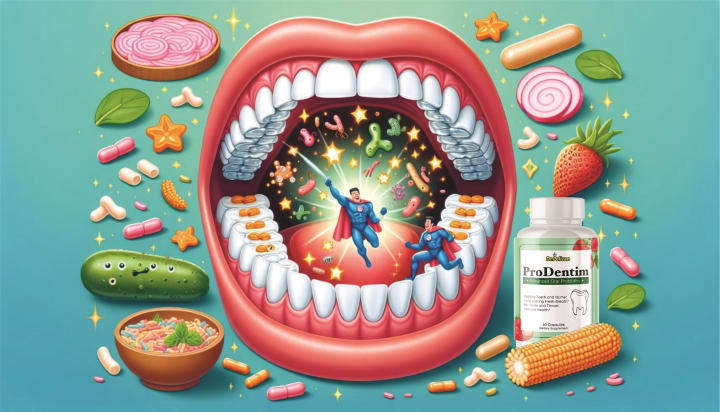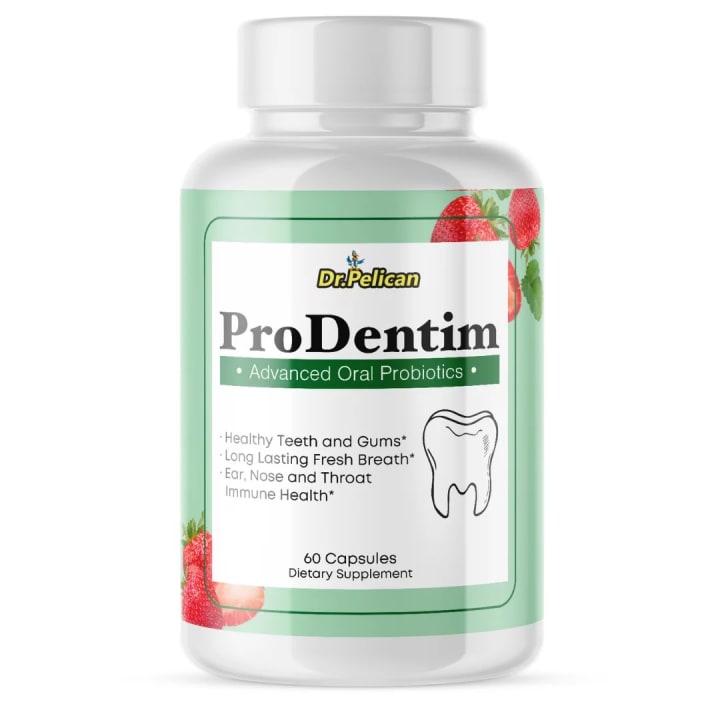The Secret to Stronger Teeth and Healthier Gums
Discover the Power of Oral Probiotics

Probiotics, traditionally heralded for their gut health benefits, are making their mark in the realm of oral health, suggesting a promising avenue for stronger teeth and healthier gums. With lactobacilli and bifidobacteria, key players in oral probiotics, constituting a minute yet pivotal part of our oral microbiome, their role in maintaining dental health is becoming increasingly recognized.
Turning to oral probiotics presents a novel approach to combat common dental issues such as tooth decay, gum disease, and bad breath, by harnessing the beneficial bacteria already present in our bodies. As research gets deeper into probiotics for oral health, incorporating these beneficial microbes into your oral care routine could be the secret to not just a brighter smile, but overall enhanced wellbeing.
Understanding Probiotics and Oral Health
Probiotic Strains and Their Role in Oral Health
1. Essential Probiotic Strains: Probiotics are living microorganisms that provide health benefits when consumed in adequate amounts. The most commonly used strains in oral health are Lactobacillus and Bifidobacterium, which are part of the normal human microbiota and have been shown to inhibit harmful bacteria like Streptococcus mutans.
2. Mechanisms of Action: The actions of these probiotics in the oral cavity are similar to those in the intestine, such as normalizing microbiota, modulating immune responses, and producing metabolic effects that could inhibit pathogenic bacteria.
Impact of Oral Probiotics on Health
• Colonization and Systemic Effects: For probiotics to exert their beneficial effects in the oral cavity, colonization is often considered essential, though systemic effects are also possible.
• Health Benefits: Regular use of oral probiotics has been linked to reduced bad breath, prevention of plaque, and decreased incidence of tooth decay and gum disease.
• Safety Profile: Probiotics are generally regarded as safe for use, with different strains showing varying efficacy depending on the health status of the individual’s oral microbiota.
Click here for the best Probiotic product

Clinical Observations and User Testimonials
• User Experiences: Several users have reported positive outcomes with specific probiotic brands. For instance, ProDentim has been noted for the effectiveness in improving breath freshness and reducing symptoms of gum disease.
• Research and Studies: Studies have shown that probiotics can significantly impact oral health by reducing the growth of harmful bacteria, which in turn helps in preventing dental diseases such as cavities and periodontitis.
The Role of Diet and Probiotics in Oral Health
• Dietary Influence: A well-balanced diet, inclusive of probiotics and prebiotics, is crucial for maintaining both oral and overall health, supporting a balanced microbiome that protects against oral diseases.
• Supplementation Forms: Oral probiotics are most effective when administered directly through lozenges, chewable tablets, or probiotic-enriched drinks, allowing direct interaction with oral tissues.
By understanding these aspects, you can better integrate oral probiotics into your daily health regimen to promote a healthier oral environment and prevent common dental issues.
Click here for the best Probiotic product

Choosing the Right Probiotics for Dental Health
Key Considerations for Selecting Oral Probiotics
1. Type of Probiotic and Strain Efficacy: Opt for strains known for their oral health benefits, such as Lactobacillus reuteri, which prevents tooth decay and gum disease, and Streptococcus salivarius K12, which reduces bad breath and protects against infections like tonsillitis.
2. Quality and Purity: Ensure the probiotic supplement is of high quality and purity. Look for products that have undergone rigorous testing and verification for potency.
3. Colony Forming Units (CFU): A higher CFU count often indicates a more effective probiotic. Strains like S. salivarius M18 are particularly beneficial for oral health and should be present in significant amounts.
4. Form of Delivery: Choose a delivery form that ensures probiotics directly interact with the oral cavity, such as lozenges, chewable tablets, or mouthwashes.
5. Consultation with Dental Professionals: Always consult with a dental professional before adding a new supplement to your regimen to tailor the choice to your specific oral health needs.
Click here for the best Probiotic product
Recommended Probiotic Strains for Dental Health
• Lactobacillus paracasei: Known to help manage oral health issues related to gum disease and tooth decay.
• Lactobacillus salivarius: Promotes a healthy balance in the oral microbiome and is effective against harmful bacteria.
• Bifidobacterium lactis BL04: Supports the immune response in the mouth and promotes healing after dental procedures.
By selecting the right probiotics, you can enhance your oral health regimen and enjoy a healthier mouth and fresher breath.
Incorporating Probiotics into Your Oral Care Routine
Step-by-Step Guide to Using Oral Probiotics
1. Begin with a Clean Mouth:
Ensure your mouth is thoroughly clean before using oral probiotics. Brush your teeth, floss, and clean your tongue to remove any food particles and bacteria. This maximizes the effectiveness of the probiotics by allowing them to adhere directly to clean oral tissues.
2. Choosing the Right Form:
Opt for lozenge forms of oral probiotics, as they are considered most effective. Lozenges allow the probiotics to dissolve slowly in the mouth, ensuring prolonged contact with oral tissues.
3. Proper Usage:
Place a probiotic lozenge in your mouth and let it dissolve slowly. Do not chew; allow it to sit for 10-20 minutes. This gives the beneficial bacteria ample time to adhere to the oral tissues and start working effectively.
4. Timing for Use:
The best time to take oral probiotics is right before bedtime. This timing takes advantage of reduced saliva flow during sleep, which helps the probiotics to stay in the mouth longer and work more effectively.
5. Consistency is Key:
Regular use is crucial. Incorporate oral probiotics into your nightly routine for best results, as consistent use helps to maintain a balanced oral microbiome.
6. Maintain Regular Dental Checkups:
While probiotics can significantly benefit oral health, they do not replace regular dental care. Continue with your usual dental checkups and cleanings to ensure overall oral health.
Click here for the best Probiotic product
Consultation and Dietary Considerations
• Consult Your Dentist:
Before starting any new oral health supplement, including probiotics, consult with your dentist or healthcare provider. This ensures the product is appropriate for your specific health needs and does not interfere with existing conditions or treatments.
• Incorporate a Balanced Diet:
Support your oral health probiotics with a well-balanced diet, rich in fruits, vegetables, and low in sugars. Include probiotic-rich foods like yogurt with live cultures to enhance the benefits of oral probiotics.
Conclusion
Throughout this exploration of oral probiotics, we've navigated the intricate relationship between our oral microbiome and overall health, emphasizing the transformative potential of incorporating specific probiotic strains into our dental care regimen. The clinical insights shared reinforce the notion that a proactive approach to oral health, particularly through the use of supplements like Lactobacillus paracasei, Lactobacillus reuteri and Streptococcus salivarius, can lead to significant improvements not only in oral wellness but in systemic health as well. This symbiosis between oral probiotics and dental hygiene illuminates a path toward not just preventing dental diseases but also enhancing our quality of life.
The significance of choosing the right probiotics for dental health, coupled with a balanced diet and consistent oral hygiene practices, cannot be overstated. As we've seen, the right application and choice of probiotic strains can ward off common dental issues while fostering a healthier oral ecosystem, which in turn, reflects positively on our overall health. Moving forward, further research and personalized dental consultations will remain pivotal in optimizing the use of oral probiotics. By embracing these microbial allies, we step closer to realizing the full potential of a holistic approach to healthcare, one that harmonizes the health of the mouth with that of the body.
Click here for the best Probiotic product
FAQs
Can oral probiotics help strengthen your teeth?
Yes, oral probiotics introduce good bacteria which can form protective biofilms. These biofilms can replace harmful ones, supporting dental and gum health, reducing inflammation, and preventing harmful bacteria from damaging enamel or gum tissues.
Which probiotics are most effective for dental and gum health?
For optimal oral health, consider probiotics such as Lactobacillus paracasei, B.lactis BL-04®, Lactobacillus reuteri, Lactobacillus salivarius, Streptococcus salivarius K12, Streptococcus salivarius M18, and Lactobacillus sakei.
Is it possible for oral probiotics to reverse gum disease?
Recent studies indicate that probiotics can significantly improve oral health and even reverse the effects of gum disease, making them a valuable tool for enhancing oral hygiene.
What are some effective ways to maintain strong teeth and healthy gums?
To keep your teeth and gums healthy, it's important to avoid sugary foods and beverages, brush your teeth twice daily, floss daily, use mouthwash, get dental sealants, and avoid smoking, chewing tobacco, and excessive alcohol. Additionally, regular dental check-ups every six months are crucial for maintaining oral health.





Comments
There are no comments for this story
Be the first to respond and start the conversation.